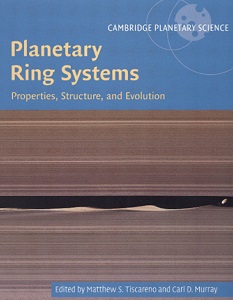It never ceases to amaze how much can be said and written these days about parts of the solar system that were shrouded in mystery only a few decades ago. Saturn’s rings are a good example: if you’ve ever had the privilege of seeing the rings through a decently-sized telescope you will appreciate their beauty; but you’ll also feel a sense of frustration at the lack of detail.
The cover image of this book shows how far we’ve come thanks to planetary spacecraft: it depicts the shepherd moon Daphnis which orbits in the Keeler Gap in Saturn’s A ring. The caption reports that “The surrounding ring structure includes wavy gap edges and spiral density waves”, but to the non-specialist it looks like an intriguing example of ‘modern art’. More scientifically, the image also illustrates the complexity of the ring structure and shows an uncountable number of individual rings.
But Saturn’s rings are only the beginning: this book includes sections on the rings of Jupiter, Uranus, Neptune and “rings beyond the giant planets”.
The text is divided into sections covering ring systems by location and by type and topic (such as thermal properties and computer simulations). A final section discusses future missions and there is a short but useful index. The book is illustrated in black-and-white and includes a colour section.
This massive tome will be of interest mainly to researchers and students of planetary astronomy, though its relatively high price is likely to restrict it to libraries and university departments.











